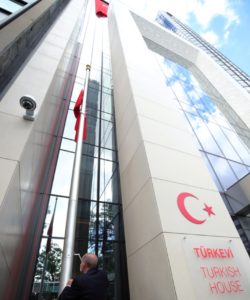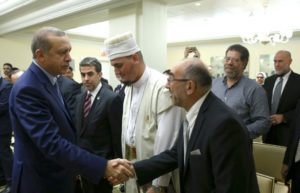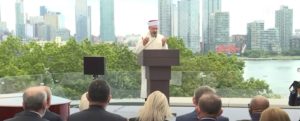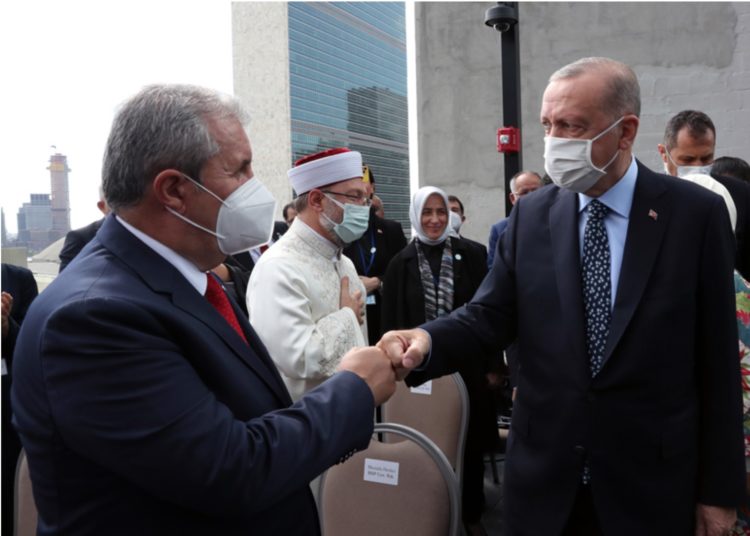Abdullah Bozkurt/Stockholm
A multi-million dollar high rise built across from UN headquarters in New York City by Turkey was described by Turkish President Recep Tayyip Erdoğan as a hub for American Muslims, who are being wooed by Turkey’s Islamist rulers in their effort to export political Islamist ideology to US soil.
Speaking on Sunday to his Muslim guests at an event organized by the Turkish American National Steering Committee (TASC), an outfit that promotes the Muslim Brotherhood with support from the Erdoğan government, the Turkish president said: “God willing, we will open our Turkish House opposite the United Nations [headquarters]. This monument of glory will serve as a home not only for our citizens but also for the US Muslim community. Inshallah, your new and united address will be this building.”
The 36-floor Turkish House was constructed by the Erdoğan government at a reported cost of nearly $300 million and houses the Turkish diplomatic and consular missions as well as commercial space that will be leased out. The building will support the Turkish government’s US operations.
TASC was investigated by the FBI in the past over its alleged interference in US politics on behalf of the Turkish government according to the leaked emails of Berat Albayrak, Erdoğan’s son-in-law.
Erdoğan likened Turkish House to a huge religious compound built Turkey in Lanham, Maryland, in 2016 at a cost of $110 million. The center is run by Turkey’s Religious Affairs Directorate (Diyanet), the Erdoğan government’s proselytizing arm in exporting political Islam abroad. The venue has hosted many US Muslim figures including members of the Muslim Brotherhood.
“The Diyanet Center of America, which we launched in 2016, continues to host joint activities [with US Muslims]. We didn’t build it only for Turks, we did it for all Muslims,” Erdoğan said.
Turkey’s autocratic Islamist ruler dedicated much of his speech to US Muslims while lashing out at the West, especially US leaders whom he accused of fanning hostility against Islam. He claimed hostility to Islam is holding politics hostage and has become a destructive trend that threatens social peace and makes the daily lives of Muslims difficult.
Noting that Muslims have been marginalized over their religion in the West, Erdoğan said, “You [US Muslims] have personally witnessed how the climate of hatred fueled by irresponsible politicians can cause deep wounds in society.”
Bragging about how his government took a leading role in the fight against such hostility, the Turkish president said, “We support all sorts of initiatives to eliminate all threats to our religion and our Muslim brothers.” He also urged US Muslims to take a bigger role in politics and asked them to get more representatives elected at the state and federal level.
Ali Erbas, the Turkish government’s top imam who heads the Diyanet, also accompanied Erdoğan during his visit to New York and offered a prayer during the inauguration of Turkish House. He paid visits to the US in the past to meet with US Muslim figures, most notably those from the Muslim Brotherhood. He met Secretary-General of the United States Council of Muslim Organizations (USCMO) Ousama Jammal at the Diyanet center in Maryland during a January 2018 visit. Erdoğan also met with Jammal in a 2016 visit.
In an October 2018 speech, Erdoğan called the Diyanet’s imams a 140,000-strong army, yet lamented that his government is not getting the desired outcome from such a big army and asked Turkish imams to do more. In November 2019 he publicly revealed that he had ordered the Diyanet to work in other countries and asked it to not leave the 6.5 million Turks abroad in the claws of imperialist projects such as moderate Islam. The Diyanet is active in some 100 countries with 2,500 imams funded by the Erdoğan government.

The Diyanet is an ideological and political state apparatus tasked with spreading President Erdoğan’s political Islamist ideology both inside and outside the country. Under Erdoğan’s rule the Diyanet’s remit and range of activities have expanded, and it has become an important tool in Turkish foreign policy. Its budget has quadrupled in the last two decades. The structure and activities of the Diyanet have been increasingly synchronized with the policies of the Erdoğan government.

Diyanet personnel who were sent abroad to run mosques were also used to spy on critics, opponents and dissidents in other countries. Some European countries have launched investigations into Turkish imams linked to the Diyanet. In December 2016 Turkey had to recall Yusuf Acar, the religious affairs attaché at the Turkish Embassy in The Hague, after Dutch authorities accused him of gathering intelligence on the Gülen movement, a group critical of the Turkish government. Similarly, Belgian authorities rejected the visa applications of 12 Turkish imams seeking to work in the country in 2017.
The government of the central German state of Hessen recently ended its cooperation with the Diyanet’s German arm, the Turkish-Islamic Union for Religious Affairs (Diyanet İşleri Türk İslam Birliği, or DITIB). “The doubts about the fundamental independence of DITIB from the Turkish government could not be resolved,” said Minister of Culture Alexander Lorz.













